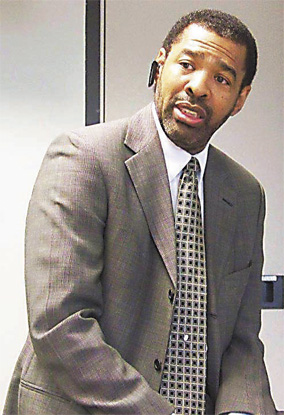EYE ON BUSINESS: Asleep in class
April 5, 2015 by Las Vegas Black Image Magazine
Filed under Conversation
WE AREN’T PAYING ENOUGH ATTENTION TO THE CRISIS FACING HISTORICALLY BLACK COLLEGES AND UNIVERSITIES
BY ERNEST FOUNTAIN
It has been said that while we are sleeping, decisions are made that affect the rest of our lives.
This has always been the case for black America, due to factors that include slavery, segregation, Jim Crow, manipulation and miseducation. Although we have risen above and emerged from a great deal of this, in some ways we are still sleeping with our eyes wide open. For instance: while we bask in the pride of having the first black president, there is an all-out war brewing both in the black business sector and the educational arena. And it’s having a detrimental effect on HBCUs (Historically Black Colleges and Universities).
A report from the U.S. Department of Education shows that federal funding for historically black colleges and universities decreased in 2012. Issued in March by the White House Initiative on Historically Black Colleges and Universities, the report reveals that 22 out of 32 federal agencies provided nearly $4.8 billion in funding to HBCUs, accounting for 2.7 percent of all funds awarded to colleges and universities nationwide. The total funding amount — counting grants, contracts, federal fi nancial aid awards to HBCU students and educational assistance programs — was $401 million less than the HBCU funding awarded in 2011. Without federal student loans, HBCUs received only $1,227,116,047 financial aid awards to HBCU students and educational assistance programs — was $401 million less than the HBCU funding awarded in 2011. Without federal student loans, HBCUs received only $1,227,116,047 — or 3.41 percent of all funds awarded to higher education institutions. While the percentage of total funds awarded to HBCUs was the third lowest between 2007 and 2012, actual dollars-to-institutions was the lowest over the same period — with an approximate average of over $11 million for each of the nation’s 105 black colleges.
Further, the financial aid system has been crippled by policy changes that shut low-income, first-generation and minority students out of the opportunity to affordably attend four-year colleges and universities. At the same time that the Pell grant was increased to “help” students, Supplemental Education Opportunity Grants (SEOG) and Perkins Loans were defunded by the federal government.
These programs served as the primary mechanisms for under-resourced institutions to fill the financial gap for students who find it difficult to pay for college even with the help of Pell grants and student loans. If a freshman dependent student has zero expected family contribution, and receives a full Pell Grant ($5,730) and full subsidized and unsubsidized federal Stafford loans ($5,500), then that student has access to a total of $11,230. For an in-state student, the average cost to attend a public 4-year institution is $18,943. That leaves a $7,713 gap that needs to be filled.
Without Perkins loans or SEOG grants to fill in that gap, the only realistic option left for most of these students was Parent PLUS. However, changes to that loan program, enacted in 2012, ensured that over 14,000 students were unable to attend HBCUs that year.
While these students were able to apply for private loans, they would not be eligible if their parents could not qualify for a Parent PLUS loan. The biggest change: a draconian tightening of credit requirements, leaving many families ineligible and forcing many students to drop out or forgo school altogether. HBCUs have lost over $300 million since the changes to Parent PLUS went into effect, experiencing enrollment declines of up to 30%.
We cannot continue to sleep as these 105 HBCUs — with close to 400,000 students, many of whom might not otherwise be able to attend college — suffer. We must open our eyes and see how the administration is either blind to what role these great institutions play in empowerment for our people, or acknowledge a diabolical intention to destroy what they do.
After all, HBCUs have played a significant role in our own community. Below, a list of black Las Vegas achievers
who, like myself (a proud alumnus of Texas Southern University), attended some of these great institutions — which have been key components of power creation in the American system:
• Commissioner Lawrence Weekly (Grambling State University)
• Assemblywoman Dina Neal (Southern University)
• Judge Karen Bennett (Texas Southern University)
• Kimberly Bailey-Tureaud (Spelman College)
• Assemblyman Wendell Williams (Southern University)
• Dr. Lynette Thomas (Texas Southern University)
• Vernon Washington (Jackson State University)
Next month: The war on black businesses.






